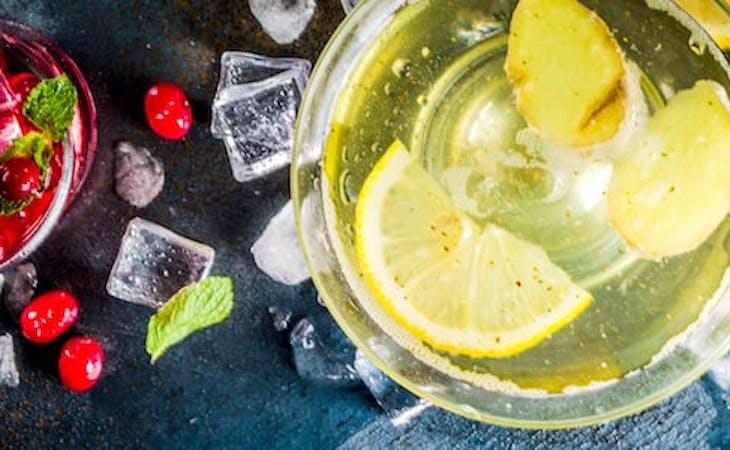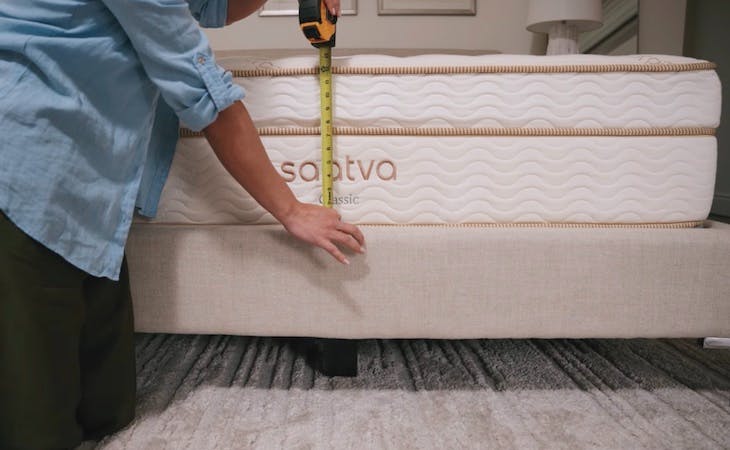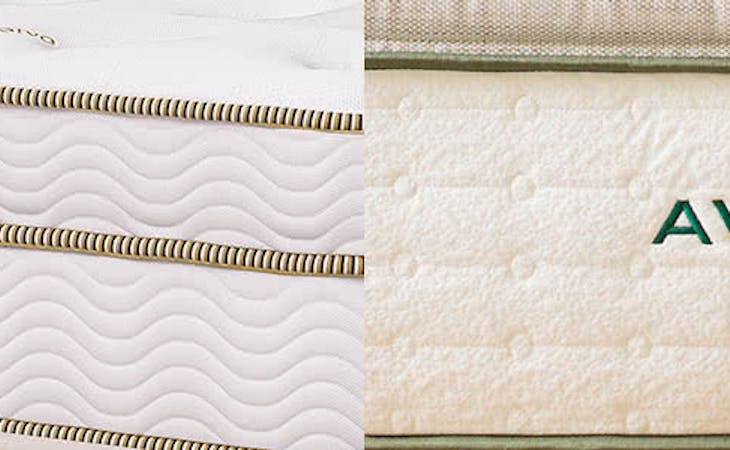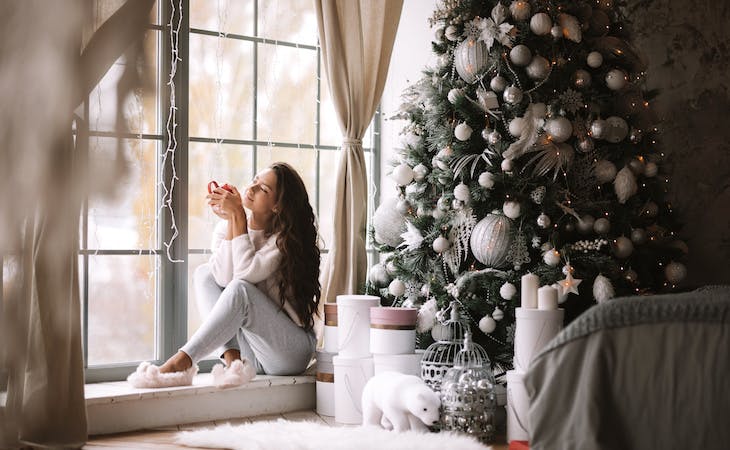I’ve never been a huge drinker, but I’ve definitely imbibed more than usual in 2020. The stress of the coronavirus pandemic, coupled with this year’s election, had me reaching for a massive glass-or two, let’s be real-of wine almost every night these last few months.
Not only did this leave me with a serious case of acid reflux, but all that alcohol also made getting a good night’s sleep pretty difficult. That’s not surprising, given that studies show alcohol negatively impacts sleep.
“While some people notice that an alcoholic drink or two causes drowsiness and aids them in falling asleep, there is evidence to suggest that alcohol, particularly in high doses, can interrupt and negatively affect the quality of one’s sleep,” says Emma M. Laing, PhD, RDN, clinical associate professor and director of the didactic program in dietetics at the University of Georgia.
To start the new year off on the right foot and get my health (and sleep) back on track, I’ve decided to do a Dry January challenge and nix booze for a whole month.
Ready to join me? Here, learn more about the origins of dry January, the sleep and health benefits that come with quitting alcohol, and how to keep yourself on track while doing a dry challenge.
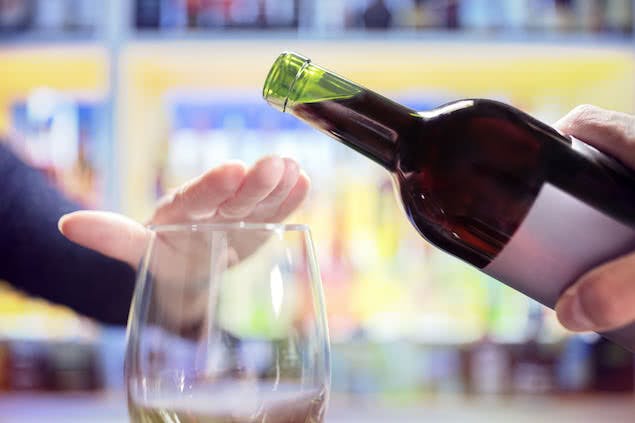
What is Dry January?
Dry January involves taking a month-long break from alcohol. Because it begins on January 1, some people participate in Dry January to kick-start a New Year’s resolution to cut back on alcohol. Other people use it as a way to reset after lots of holiday drinking.
The first Dry January took place in 2013. The campaign originated with Alcohol Concern, a UK organization, as a way to encourage mindfulness around alcohol consumption.
That first year, 4,000 Brits took the challenge, and it’s since expanded worldwide. Close to 25% of Americans reported interest in participating in Dry January in 2019.
Other popular months to stop drinking include September and October, which you’ll often see referred to as Sober September and Sober October. But really, you can do a dry challenge any month of the year.
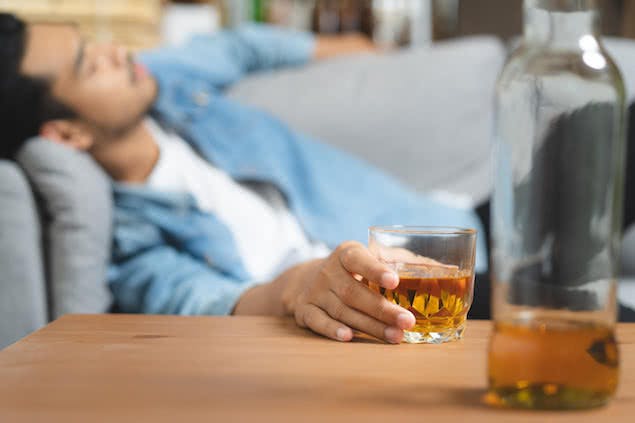
How does Dry January impact sleep?
Even taking a short hiatus from drinking alcohol can result in better quality sleep. In fact, according to 2015 research out of the University of Sussex, 62% of Dry January participants reported better sleep.
“Appreciating the various ways in which alcohol can disrupt sleep, it makes sense that taking a break from drinking can result in more restful nights,” says Laing.
She does note, however, that heavy drinkers who decide to stop drinking abruptly may experience withdrawal symptoms before they start to see the sleep benefits. “Multiple factors, including how much and how often you drink, can contribute to the severity of these withdrawal symptoms,” she says.
According to research out of the University of Sussex 62% of Dry January participants in 2015 reported better sleep.
Hilary Sheinbaum, journalist and author of The Dry Challenge: How to Lose the Booze for Dry January, Sober October, and Any Other Alcohol-Free Month, first took the Dry January challenge in 2017 and noticed improvements in her sleep.
“When I gave up alcohol for one month, one of the most surprising epiphanies was my quality of sleep,” she says. Before taking the challenge, Sheinbaum says she used to sleep an average of five hours a night, often waking up in the middle of the night.
“I truly thought that was due to my crazy-busy New York City life, my around-the-clock job, and my anxiety as a whole,” she says. “Nope! Not long into my first Dry January, I realized that even though my work and lifestyle were as busy as ever, I was sleeping seven to eight hours each night, which was a personal record.”
The only change Sheinbaum had made in her life? Giving up alcohol.
What other health benefits does Dry January have?
Laing says additional health benefits of cutting out alcohol, even for a short period, include an improved immune system and liver function, as well as a heightened ability to curb mindless snacking.
Per the University of Sussex research, 62% of Dry January participants reported more energy, while 82% felt a sense of achievement. Additionally, 49% of participants said they lost weight.
One of the more surprising benefits for Sheinbaum, meanwhile, had to do with her skin.
“My skin looked infinitely clearer and more glowy, even in the dead, dull, month of January,” she says. “As it turns out, alcohol dehydrates your body-including your skin.”
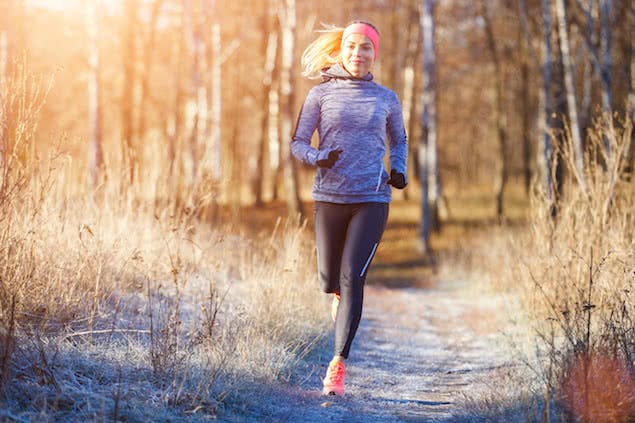
How do you make sure your Dry January is successful?
A month without booze might sound daunting, but there are some things you can do to ensure the process goes smoothly.
Be clear about your intentions
Make a list of the top reasons you’re giving up alcohol to remind yourself why you’re taking this break in the first place, suggests Laing. “Keep your list in a prominent place and refer to it when the urge to drink strikes,” she says. “If possible, talk about your intentions with your friends, family, and your healthcare provider, so they understand and are able to offer support when needed.”
Enlist a friend to do it with you
“For first-timers, I suggest recruiting a friend or friends to partake in the challenge with you,” says Sheinbaum. Her first Dry January stemmed from a spontaneous bet she made with a friend on New Year’s Eve in 2016. “The first year I did the dry challenge, and made a Dry January bet, it felt like a group effort,” she says. “It was so helpful to have a friend to keep me accountable-and also share tips and tricks along the way.”
Replace drinking with another activity
These last few months, I’d always reach for a glass of wine at the end of a stressful day. But there are healthier ways to relieve anxiety, and Dry January is the perfect time to incorporate some of these activities into your routine. Try taking a relaxing bath, going for a walk around the block with your pet, or cooking a new recipe, says Laing.
“Even during the coronavirus pandemic, there are a ton of activities that Dry January and dry month participants can enjoy,” adds Sheinbaum. “I highly recommend physical activities like yoga, running, or weightlifting, if that is available to you, for the sake of endorphins.” Sheinbaum is a big fan of baking to relieve stress too.
Keep alcohol out of sight
“If you think you’ll be tempted by having alcohol in the house, put it away or give it to a friend to temporarily hold,” suggests Sheinbaum. As she notes, the point of a dry challenge isn’t to torture you. “It’s to make a dry month as simple, easy, and as enjoyable as possible,” says Sheinbaum.
One thing that might make Dry January a little easier in 2021? With much of the world still in lockdown, you won’t have to worry about turning down happy hour plans-or about being peer-pressured into drinking.
Sip tasty non-alcoholic beverages
“Replacing what is in your glass or cup doesn’t have to be fancy or require a lot of effort,” says Laing. “Making a cup of soothing hot or iced tea, coffee, or hot chocolate can be a helpful alternative, along with juices, smoothies, bubbly waters, and other beverages you have on hand that pique your interest.”
Sheinbaum likes flavored seltzers, as well as Gruvi’s non-alcoholic prosecco and Athletic Brewing Company’s non-alcoholic beers. (For more inspiration, we’ve rounded up these delicious mocktail recipes.)
Make healthy alcohol choices the rest of the year
Once Dry January is over, use what you learned to drink responsibly the other 11 months of the year. When writing her book The Dry Challenge, Sheinbaum learned that the average adult spends two years of their life hungover-and anyone who’s ever had a hangover knows they’re not exactly fun.
According to the Dietary Guidelines for Americans, drinking in moderation means no more than one drink per day for women and two drinks per day for men. Keep in mind that a serving of alcohol is a 12-ounce beer, 5-ounce glass of wine, or 1.5 fluid ounces of distilled spirits.
“If you are drinking more than this, yet you don’t wish to abstain from alcohol entirely, you should aim to meet these national guidelines in order reap the benefits of an otherwise healthy eating pattern,” says Laing.
An easy way to drink less? Choose a light-alcohol beverage, such as a wine spritzer. To make your own, pair wine with sparkled water, either flavored or plain, and add fresh fruit or a splash of juice if you’d like, suggests Laing.
“Sparkling water can also be added to hard liquors as a way to reduce the alcohol content in a single serving,” she says. Kombucha is another great option. “It’s known for providing a strong and sharp taste, yet only trace amounts of alcohol,” says Laing.
Trouble sleeping? Your diet could be to blame. We’ve rounded up the worst foods to eat before bed.





